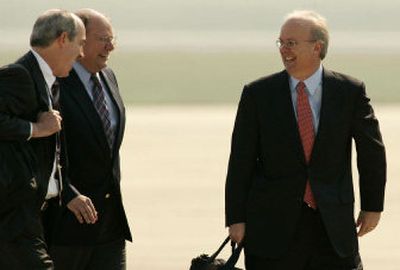Rove busy plotting GOP future

WASHINGTON – Out from under a cloud of suspicion, Karl Rove, President Bush’s political chief, is working feverishly at what he loves best: plotting aggressively to boost Republicans’ election-year chances.
Since learning in June that he would not be indicted for his role in the unmasking of a CIA officer’s identity, a slimmed-down Rove has thrown himself into his latest, career-defining test. He knows the outcome of the November elections will determine how successful he has been in reaching his goal of cementing a lasting Republican majority and, in the shorter term, how influential Bush can be during his last two years in the White House.
“Just as Karl was instrumental in getting Bush elected and re-elected, he’s also instrumental in making sure the last two years are actually the last two years of the Bush administration and not a period where the president sits around in the White House while nothing gets done,” said Grover G. Norquist, the conservative activist who heads Americans for Tax Reform.
Most of Rove’s work goes on behind the scenes. But when he pulls back the curtain, as he did at an Ohio fundraiser last week for gubernatorial candidate J. Kenneth Blackwell, he rarely misses a chance to go for Democrats’ jugular.
Rove’s “trademark approach is to hit hard, near the edge. He likes to go for the opponent’s strength and undermine it with edgy tactics,” said Bruce Buchanan, a University of Texas political scientist who has tracked Rove’s career.
This year is a prime example. Republicans “know that they’re up against it, that the odds are against them,” Buchanan said. Rove’s “grand dream,” he added, “is in jeopardy right now.”
Publicly optimistic, despite the threat of Republican losses this fall, the man Bush calls “the architect” is quietly dispensing advice, helping with strategic planning and raising money. His task includes some spine-stiffening for skittish candidates who worry that their support of the president, including backing the war in Iraq, could count against them at the polls.
Not so, says Rove, who has argued that Republicans will win based on a full-throated defense of the war and Bush.
Bush alluded to the strategy himself at a news conference last week, saying Republicans should use the campaign to “clarify the different point of view. There are a lot of people in the Democrat Party who believe that the best course of action is to leave Iraq before the job is done, period. And they’re wrong.”
The approach is typical of Rove, who has spent his career turning adversity into opportunity.
Bill Israel, a University of Massachusetts journalism professor who taught a course with Rove a decade ago in Austin, said Rove seizes opportunities the same way some people eat chocolate: “Quickly, happily, greedily, with no regrets.”
Among his greatest talents, added Israel, who says he’s in touch with Rove, is his ability to exert “absolute image control” on candidates by arming them with basic strategies – dampen expectations, hammer home simple, consistent themes – while working like a maestro to appeal to potential blocs of supporters.
That, plus Rove’s no-holds-barred tactics, has made him one of the Bush administration figures most reviled by Democrats.
Rep. John P. Murtha, D-Pa., a former Marine who has emerged as a vocal critic of Bush’s handling of the Iraq war, painted a harsh caricature this year. Rove was “sitting in his air-conditioned office with his big, fat backside, saying, ‘Stay the course.’ That’s not a plan,” Murtha sniffed to NBC.
His comments came after Rove, in a speech at a Republican fundraiser, singled out Murtha and Sen. John Kerry, D-Mass., Bush’s 2004 challenger, as Democrats who “are ready to give the green light to go to war, but when it gets tough and when it gets difficult, they fall back on that party’s old pattern of cutting and running.”
Such sharp rhetoric reflects Rove’s view that “a good offense is the best defense,” Norquist said.
Still, even Rove has sometimes found himself at odds this season with Republicans, some of whom have distanced themselves from the president, fearing any association with his low poll numbers and the public frustration with the war.
Ken Mehlman, chairman of the Republican National Committee, said Rove’s objective isn’t to get all Republicans singing from the same hymnal, but to tailor their messages to appeal to voters across the spectrum.
“The strategic goal this year is not to get Republicans to support the president, it’s to help them win, and you do that by clarifying the differences between electing a Republican and electing a Democrat,” Mehlman said.
But Rove, whose portfolio spans politics, policy and personnel, has also been a point man on what some Republicans regard as a more dubious issue: Bush’s push for a plan that would allow some illegal immigrants to gain citizenship.
Rove has stayed upbeat despite discouraging poll numbers, just as he did during the CIA leak episode, when speculation that he would be indicted reached a fever pitch.
By some accounts, the shadow of the investigation hung over Rove longer than he anticipated. In a note to Israel early in December, Rove wrote that he thought he would have the whole thing cleared up within 10 days. The whiff still follows him, in the form of a civil lawsuit by Valerie Plame, the outed CIA officer, and her husband, Joseph C. Wilson IV, against him, Vice President Dick Cheney and others.